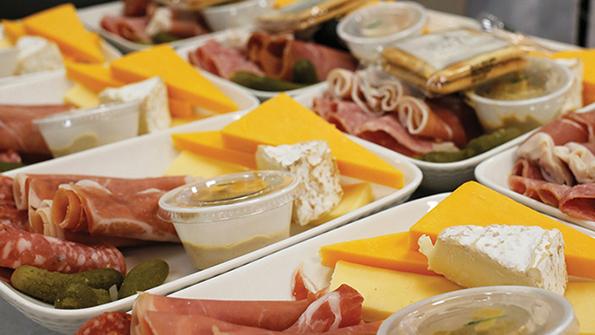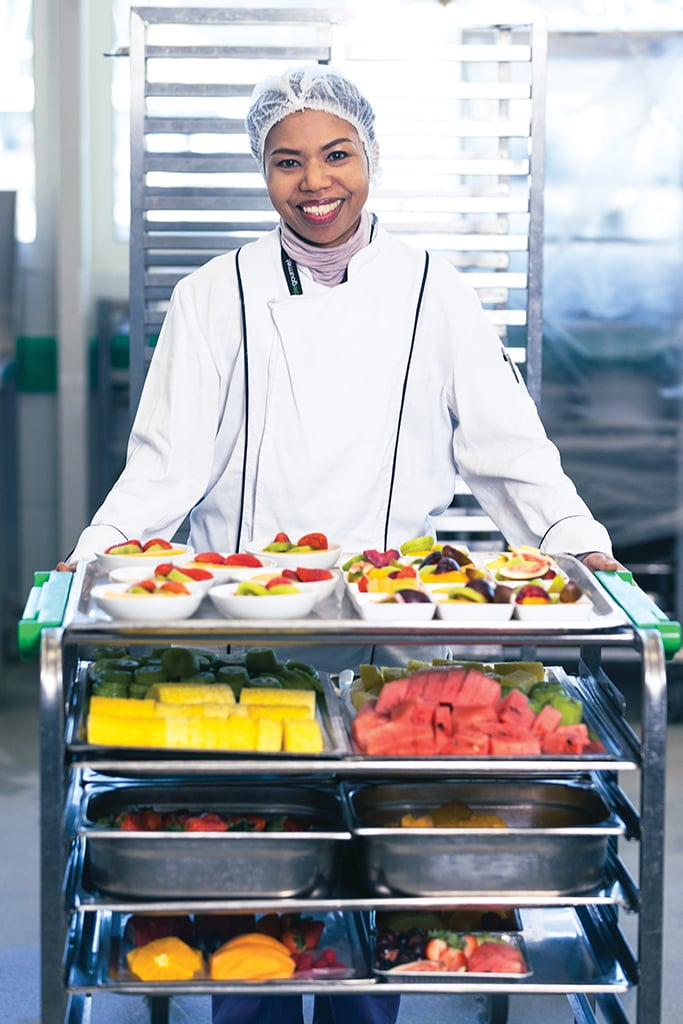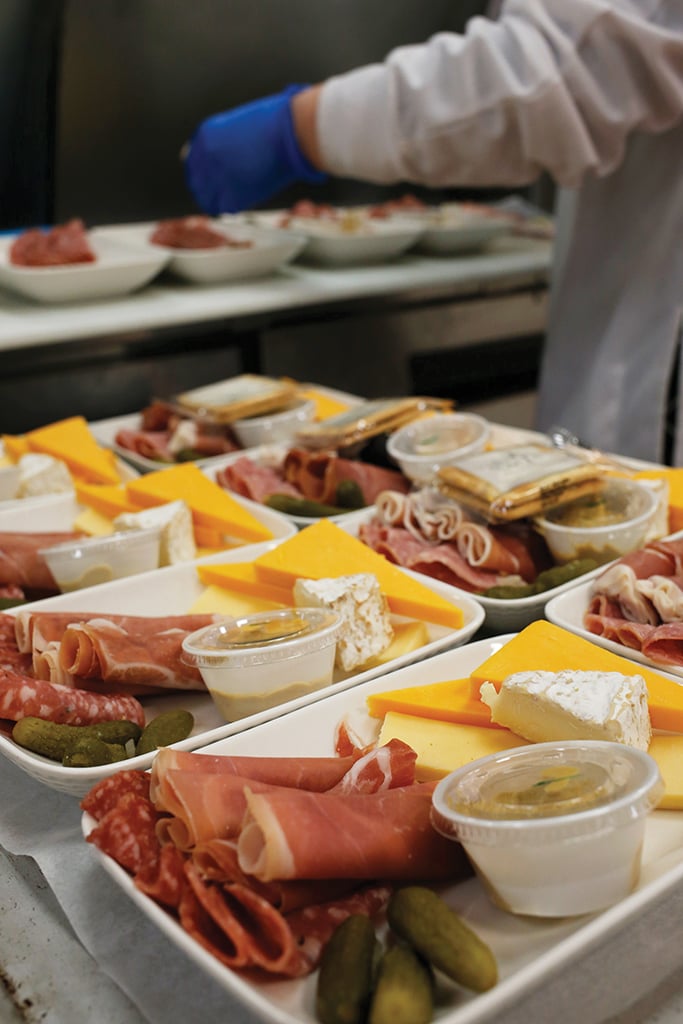
Airline catering companies, like airlines, have been dealing with dramatically fluctuating demand over the last few years while also adapting to the changing demands in sustainability.
Zurich-based gategroup, which provides catering services to airlines that include Air France, British Airways, LATAM, SAS Scandinavian Airlines, Virgin Atlantic and United Airlines, saw revenue declines of up to 90% at the beginning of the pandemic in 2020.
Compared to 2019 figures when more than 700 million passengers were served on 5 million flights, in 2022 gategroup said 300 million passengers were served on just over 3 million flights.
Gategroup CEO Christoph Schmitz told ATW that at the beginning of the pandemic, the airlines first curtailed services to reduce touchpoints.
“A lot of services that were pretty standard had to be either reduced or discontinued,” he said. “If you had two or three meal services, they were reduced to one or zero; a lot of flights just served water, and some had nothing. From the airlines’ perspective, it was also a way for them to reduce costs.”
Schmitz said gategroup procures roughly more than $2 billion worth of food products annually. While airline service levels have returned to near pre-pandemic levels, “conceptually we have gone through a long phase of reduction in the volume of food that is served on board.” At the same time, he said a lot of airlines have moved to charging for food. “So, these are probably the big changes,” he said.

Quality
But Schmitz said airlines have also recognized that food is an “important differentiator” when it comes to their brand and customer satisfaction.
“And what we are seeing is that over the last probably one or two years—and particularly lately—is a strong push to improve food quality,” he said.
At gategroup’s 126,000-sq.-ft. kitchen facility at Washington Dulles International Airport (IAD), one of 30 locations in the US and around 200 globally, some 900 employees produce more than 50,000 meals per week for delivery to all cabin classes. In the summer months that number jumps to more than 100,000. After arriving at the facility in bulk-sized containers and crates, the food products—cans, eggs, meat, grains, fresh produce, drinks, desserts and packaged snacks—are separated, cooked and packaged according to each airline’s specifications. Local chefs supervise and digitally monitor the entire process to ensure quality and safety.
Airlines are paying particular attention to the front of the cabin on international flights to offer an “exceptional food service experience” that goes beyond chicken or beef or pasta as a vegetarian option.
An example is United Airlines’ Studio Ellen, an experimental kitchen in which local chefs try to innovate on different types of food offerings for United’s Polaris first- and business-class passengers. Studio Ellen is named after the Chicago-based carrier’s first flight attendant, Ellen Church, in 1930.
In 2021, gategroup and United began a partnership to develop Studio Ellen, which United describes as “a culinary think tank and community of local, world-class culinary talents and chefs brought together exclusively to interpret the United brand through the power of data to create experiences that exceed the expectations of every United guest.”
The first test kitchen near its Chicago headquarters opened in January.
Trends
“We are trying to understand customer requirements better through predictive data analytics where we are actually listening to our customers to find out what they really want—what they like and don’t like,” Schmitz said. “Then we try to adjust our meal offerings and the food we propose to airlines.”
In addition, gategroup employs an innovation chef, based in Miami, Florida, whose sole job is to present up-and-coming food trends to create new menus for airlines.

Even before the pandemic, airlines were beginning to keep an eye on food and retail trends. In 2018, gategroup and London-based predictive analytics technology provider Black Swan teamed up to create a joint venture (JV) called Trendscope, a social prediction platform that tracks social media to identify the latest food and retail trends.
At the end of 2020, the JV launched a winter trial of its Epax digital retail solution—working in partnership with Black Swan Data—with UK LCC easyJet. The Epax platform allows passengers to access onboard retail personalized offerings from their own devices. The company has completed further trials and is looking to roll out the proposition this year with “key airline partners.”
Sustainability
In line with aviation’s sustainability goals, gategroup aims to become a net zero business by 2050. Schmitz said gategroup has a dedicated senior management team that works solely on ESG goals.
“We are also upgrading our reporting; we have clearly defined targets and are delivering against those targets as a company. We also have set these targets for our suppliers,” he said. In addition, buying local produce is becoming more important to save on shipping and fuel costs.
Other initiatives include moving toward a circular economy where single-use plastics are no longer used. Instead, Schmitz said, “As an intermediate step we have also introduced alternative products such as wooden cutlery, for example, or resin-based products and reusable plastics.”
Another investment has been in food packaging developer deSter, which launches products made from renewable sources that can be recycled or composted.
“We have come a long way in the improvement of these types of products, which to a large extent are now marine biodegradable or compostable,” he said.
Schmitz said the company is involved in several sustainable pilot programs.
“There is a big push on the equipment side,” he said, adding, “The future of catering is going to be reusable equipment. And that is where we are working on a number of pilots on fully rotational equipment that will often be RFID-chipped for tracking purposes.”
Gategroup is also piloting pre-order/pre-select options.
“If people order something beforehand, the likelihood that they’re going to eat it is very high. That, of course, also reduces food waste,” Schmitz noted.
The company is in a pilot project with a sister company that is testing video equipment and analyzing food waste with video-based artificial intelligence “where we are actually filming all the waste that is coming back from the planes and analyzing what has been consumed, what has not been eaten, and what can potentially be reused. Anything that is sealed or packaged can potentially be reused.”
In addition, he said gategroup has committed to have 30% of its food offerings to be vegetarian or vegan dishes, which have a “significantly better” carbon footprint than meat or pasta dishes.
“It’s a trend anyway, and passengers are asking for it,” he said. “We believe this trend is going to accelerate.”





